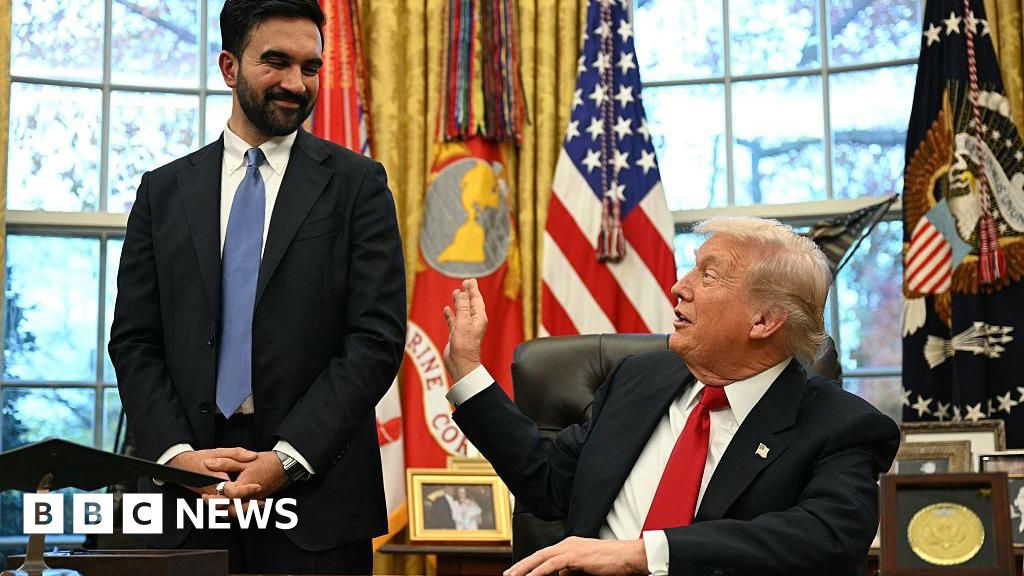Trump & NYC Mayor Mamdani's Surprising White House Meeting: From 'Despot' to Dialogue on Affordability
 United States
Politics
United States
Politics

Former President Trump and NYC Mayor-elect Zohran Mamdani held a surprisingly cordial White House meeting, focusing on New York City's affordability crisis and
Trump and NYC Mayor-elect Mamdani: An Unexpected White House Détente
In a political turn of events that defied all expectations, former US President Donald Trump and New York City's newly elected mayor, Zohran Mamdani, engaged in a surprisingly cordial meeting at the White House. Billed by some as a potential political clash, the encounter instead blossomed into a remarkably conciliatory discussion, primarily centered on addressing New York City's pressing affordability crisis.
Prior to their Friday meeting, the rhetoric from both sides had been notably sharp. Mamdani, a self-described Democratic socialist, had labeled Trump a "despot" during his election victory speech. Conversely, Trump's spokeswoman had provocatively characterized Mamdani's upcoming visit as a "communist coming to the White House." However, these pre-meeting barbs evaporated in the Oval Office, replaced by smiles and a shared emphasis on collaborative solutions.
Focus on Affordability Takes Center Stage
The most striking takeaway from the meeting was the unwavering focus on New York City's cost-of-living issues. Both Trump and Mamdani repeatedly highlighted their mutual interest in tackling the affordability crisis. This shared objective appeared to be a strategic pivot for both, recognizing its critical importance for political success.
Mamdani, whose mayoral campaign was laser-focused on affordable housing and initiatives like freezing rent increases, consistently redirected conversations back to this topic. Even when pressed on differing views, such as Middle East peace, Mamdani underscored that voters, including Trump supporters, desired an "end to forever wars" and leadership addressing the "cost-of-living crisis." Trump, who campaigned on economic stability and inflation concerns in his re-election bid, also echoed the importance of economic issues.
Unexpected Rapport and Shared New York Roots
The friendly atmosphere was evident from the moment the two men addressed the press. Trump, seated behind the Resolute Desk, appeared relaxed, and his body language suggested an absence of animosity. Rather than attacking Mamdani, Trump offered praise, expressing hope that Mamdani would be a "really great mayor" and adding his confidence in Mamdani's ability to do a "very good job."
Even when reporters reminded them of their previous political insults – Trump calling Mamdani a "communist" and Mamdani referring to Trump as a "fascist" – both men deftly deflected, returning to their shared goals. Trump even playfully interjected, tapping Mamdani's arm, telling him it was "easier" to just say "yes" to the fascist label than explain. The closest Trump came to criticism was noting Mamdani's views were "a little out there."
Perhaps the most telling moment of cordiality came when Trump dismissed a reporter's question echoing an attack from a top ally, Republican Congresswoman Elise Stefanik, who had referred to Mamdani as a "jihadist." Trump quickly refuted the notion, adding that such statements are "things sometimes in a campaign."
Their shared New York heritage also played a role. Both men are New Yorkers, with ties to the borough of Queens – Trump's childhood home in Jamaica Estates and Mamdani's current residence in Astoria. Mamdani noted their "shared love" for the city, and Trump fondly reminisced about his hometown, even suggesting he might have liked to be mayor himself in a different political life.
Broader Implications for 2026 Midterms
The cordiality extended beyond affordability to discussions on law enforcement and immigration. While Mamdani voiced resident concerns about federal immigration enforcement, Trump emphasized their common ground on crime, stating, "He doesn't want to see crime and I don't want to see crime." Trump even expressed feeling safe in a Mamdani-led New York.
This surprising display of unity carries significant political weight. Republicans had reportedly planned to use Mamdani, with his democratic socialist leanings, as a "bogeyman" for the 2026 midterm elections, portraying him as anti-police, anti-capitalism, and anti-Israel. However, the unexpected chumminess in the Oval Office could significantly complicate, if not undermine, this strategy. Trump himself remarked that he believed Mamdani would "surprise some conservative people." While the longevity of this truce remains uncertain once Mamdani officially takes office on January 1st, the meeting offered a compelling glimpse into a pragmatic political future.





